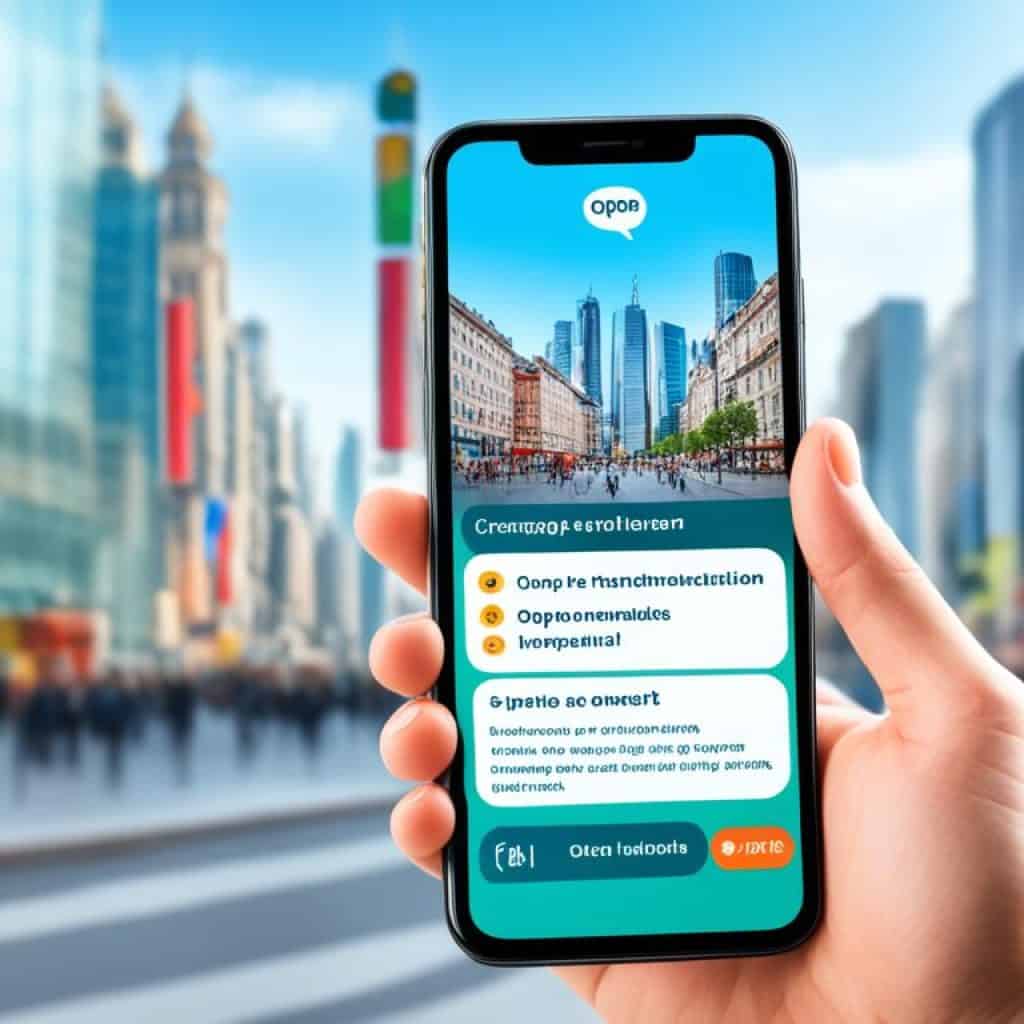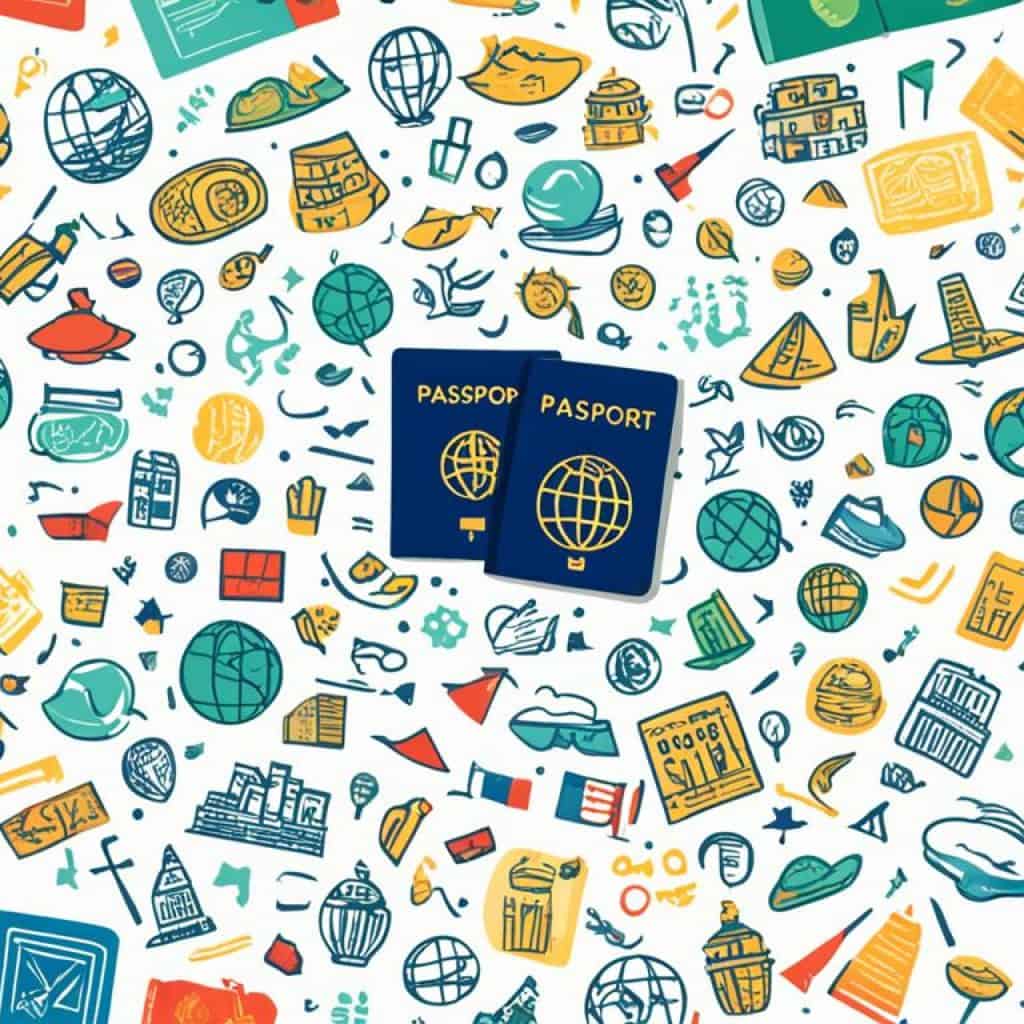Have you ever wanted to master the Tagalog language quickly? Whether it’s for a trip to the Philippines or connecting with locals, learning Tagalog can unlock new opportunities. Here are some quick tips to help you master Tagalog easily.
Key Takeaways:
- Learning Tagalog is important for effective communication in the Philippines.
- Understanding the history and cultural context of Tagalog can enhance your learning experience.
- Tagalog is one of the national languages of the Philippines and is widely spoken.
- The history of the Philippines has had a significant influence on the Tagalog language.
- There are various resources available for learning Tagalog, including online courses and language exchange programs.
The Importance of Learning Tagalog in the Philippines
Tagalog is a national language of the Philippines and very important there. While English is common, especially in cities, learning Tagalog helps you connect with locals. It helps you enjoy the culture fully. The Philippines has many languages and dialects. Tagalog is essential for talking to people all over the country.
The Philippines is known for its beautiful places, fun festivals, and friendly people. To really get to know the country and its people, learn Tagalog. It’s useful whether you’re visiting Manila, exploring small villages, or working there. Speaking Tagalog helps you talk better with locals and understand daily life.
Language is key to understanding a culture. Learning Tagalog lets you see the traditions, values, and beliefs of Filipinos. It shows you care and want to be friends. Talking in Tagalog makes your time in the Philippines special and memorable.
Learning Tagalog also has practical benefits. It’s good for jobs and business, especially in tourism, hospitality, and customer service. Knowing Tagalog helps you work with the local market. It makes marketing strategies more effective in the region.
As companies grow worldwide, knowing Tagalog helps in global strategies. Companies can talk to Filipino customers better by using Tagalog. They can make their products fit local tastes. This builds a strong brand in the Philippines.
Tagalog Language Statistics
| Language | Number of Speakers |
|---|---|
| Tagalog | Approximately 28 million as a first language |
| English | Approximately 45 million as a second language |
| Second languages | Ilokano, Cebuano, Hiligaynon, Waray, Kapampangan, Pangasinan, Bikol, Maranao, Maguindanaoan, Tausug, and more |
Tagalog is spoken by many in the Philippines. It’s important for day-to-day talks and work. Knowing Tagalog is great for doing well in the Filipino market.
Learning Tagalog is great for you. It helps you understand other cultures. It also opens up new chances. Dive into the Tagalog language and enjoy your journey!
Historical Influence on Tagalog
The history of the Philippines has greatly shaped Tagalog, turning it into a unique cultural blend. The nation’s history under Spain and the United States is mirrored in the Spanish and English impacts on Tagalog. Spanish rule introduced Spanish as the official language, affecting Tagalog’s vocabulary and grammar deeply.
Following American colonization, English also became an official language. This added many English words and structures to Tagalog. These changes have made the language richer.
Because of these historical impacts, Tagalog includes many Spanish words. This makes it easier for Spanish speakers to learn. English’s influence has also made Tagalog more understandable for English speakers, mainly in cities where English is widely spoken.
The development of Tagalog shows the Philippines’ rich cultural past. It also underlines the role of language translation and linguistic solutions. Handling Tagalog’s Spanish and English influences is key for effective multilingual communication and international content strategies.
Influences of Spanish and English on Tagalog:
“Tagalog beautifully showcases the Philippines’ historical path. The Spanish and American eras have deeply marked the language, creating an intriguing linguistic mix.” – Dr. Maria Santos, Linguistics Professor
Grasping Tagalog’s history not only makes language learning richer but also deepens cultural insights. It helps people understand the historical backdrop and how languages intertwine within Filipino culture.
Learning Tagalog Fast and Easy
Learning Tagalog can be fast and easy for beginners. Tagalog uses the Latin alphabet, which is familiar to English speakers. The pronunciation is straightforward, with words pronounced as they appear.
Resources like Glossika focus on original Tagalog vocabulary. This helps learners understand the language and culture better.

“Tagalog is a fascinating language. It offers a unique look into the rich culture of the Philippines. With easy pronunciation and lots of resources, learning Tagalog is enjoyable and fulfilling.”
Why Learn Tagalog?
Tagalog is spoken by many in the Philippines. Learning it can enhance communication and cultural experiences, whether you’re traveling there or know Filipinos.
The Latin Alphabet Advantage
Tagalog’s use of the Latin alphabet is a big plus. It makes words easier to recognize and pronounce for English speakers.
Glossika: Unlocking Tagalog’s Vocabulary
Glossika is great for learning Tagalog well. Its courses teach original vocabulary, giving a deep understanding of the language and culture. With Glossika, you learn at your pace.
Immerse Yourself for Faster Progress
Immersion is key to mastering Tagalog. Watch Tagalog movies, listen to music, and talk with natives. This improves your skills and your understanding of Filipino culture.
Practice Makes Perfect
Consistent practice is vital in learning Tagalog. Use apps, online resources, and language exchanges to reinforce what you know and get better.
Quick Tips for Learning Tagalog:
- Start by learning common phrases and vocabulary.
- Practice speaking and listening regularly.
- Find language exchange partners or native Tagalog speakers to practice with.
- Use flashcards or mnemonic devices to memorize new words.
Learning Tagalog can be a fun and rewarding experience. Use available resources and immerse yourself in the language and culture for quick progress.
| Advantages of Learning Tagalog | Resources |
|---|---|
| Enhanced communication with Filipinos | Glossika, language exchange programs |
| Deeper cultural understanding | Online courses, Tagalog movies and music |
| Expanded career opportunities | Online tutors, language learning apps |
Common Tagalog Phrases for Travel
Traveling to the Philippines is an exciting adventure. Learning some common Tagalog phrases can make your experience even better. By knowing basic greetings, introductions, asking for directions, and how to order food, you’ll be able to connect with locals. Here are some important Tagalog phrases to help you start:
- Kumusta – Hello/How are you?
- Salamat – Thank you
- Pakipoint – Please point/Show me
- Papunta sa – How do I get to…
- Paano pumunta sa – How do I go to…
- Pangalan ko ay – My name is…
- Ang pangalan ko ay – My name is…
- Bababa ako dito – I will get off here
- Magkano ito – How much is this?
- Mayroon ba kayong menu sa Ingles – Do you have an English menu?
- Magkano ang bayad – How much is the fare?
- Isang bote ng tubig, salamat – One bottle of water, please
Sanlibong salita ang nais matutunan, ngunit isang patak ng wika ang magbubukas ng pinto ng puso ng maraming tao.
Learning these phrases helps you communicate better and show respect for the culture. So, get your bags ready and start your Tagalog language adventure!
Resources for Learning Tagalog
Learning Tagalog offers various tools and resources to aid your journey. There are interactive lessons, exercises, and tailored instructions to improve your skills. Whether online platforms or tutoring suits you, there’s something for everyone. Consider these recommended options:
1. Online Language-Learning Platforms
Platforms like Ling and Glossika have courses to enhance your Tagalog. They provide interactive lessons, audio, and vocabulary exercises for all levels. With these platforms, you get numerous learning materials easily.
2. Language Exchange Programs
Language exchange programs let you practice Tagalog with native speakers. You connect with partners, practicing Tagalog while helping them learn your language. This method boosts your spoken Tagalog skills.
3. Online Tutors
Online tutors are great for personalized learning. They offer tailored lessons based on your needs and skill level. Tutors can give feedback, answer questions, and help improve your proficiency. With online resources, arranging sessions is easy.
Using these resources can speed up your Tagalog learning. Whether it’s online platforms, language exchange, or tutors, practice and commitment are key. So, dive into these options and begin your Tagalog journey today!
Tips for Teaching Tagalog to Children
Teaching Tagalog to children is rewarding. Introduce them to their cultural roots and language skills. Make learning fun and lively with these tips:
1. Incorporate Tagalog into Daily Conversations
Start by using Tagalog words and phrases every day with the kids. Use greetings and common expressions during your chats. This helps them get used to the language and encourages them to speak it too.
2. Read Tagalog Children’s Books
Reading helps kids learn Tagalog words and how sentences are formed. Pick children’s books in Tagalog that are fun and interactive. Reading together not only boosts their language ability but also brings you closer.
3. Utilize Interactive Tools
Make learning fun with videos, games, and flashcards. Many online resources offer educational content for teaching Tagalog to kids. These interactive tools keep learning exciting and help them understand the language better.
4. Encourage Regular Practice
Practicing Tagalog often is key. Include it in their daily routine. They could name objects, sing songs, or chat in Tagalog. Regular practice improves their skills and confidence.
5. Create a Supportive Learning Environment
Make sure learning feels safe and positive. Cheer their efforts, and celebrate their progress. Your excitement about their learning makes them proud of what they achieve.
Following these tips makes learning Tagalog fun and rewarding for kids. With practice, interactive learning, and support, they will love the language and speak it fluently.
Continue reading for more tips and strategies to master Tagalog in our next section.
Easiest Way to Learn Tagalog
To master Tagalog, build a strong foundation in vocabulary and grammar. Focus on these areas to speed up your learning and boost your confidence in speaking Tagalog. Here are tips to make learning Tagalog easier:
- Immerse Yourself: Dive into the Tagalog language by listening to music, watching movies, and talking with native speakers. This will help you get used to the sounds and patterns of Tagalog, improving your listening and speaking abilities.
- Utilize Language-learning Apps: Use language-learning apps and online tools designed for Tagalog. These resources offer interactive lessons, vocabulary exercises, and guides on pronunciation. They allow you to practice and monitor your progress at your pace.
- Practice Regularly: Practicing every day is key. Dedicate time each day for Tagalog, using flashcards, speaking, or writing exercises. The more you practice, the quicker you’ll grasp the language.
- Engage with Native Speakers: Talking with native Tagalog speakers can vastly improve your skills. Look for language exchange partners or join online groups. Here, you can chat and get feedback on your speaking and comprehension.
- Join Language Classes: If you prefer organized lessons, think about joining Tagalog language classes. You’ll learn from experienced instructors, practice with other students, and get personalized advice on your learning path.
Remember, staying consistent and immersing yourself in Tagalog is crucial. Embrace the language, practice often, and don’t worry about making mistakes. With hard work and the right resources, you’ll be on your way to fluency in Tagalog.
Testimonials:
“Language-learning apps have made studying Tagalog easier. I love the interactive, fun lessons. I suggest using these apps in your study routine.” – Sarah, Language Enthusiast
“Getting into Tagalog through movies and chats with locals has sped up my learning. It deepened my understanding of the language and culture. It makes me feel closer to the Philippines.” – Michael, Tagalog Learner
Learning Tagalog shouldn’t be hard. With the right strategies and tools, you can make great strides in your language journey. Begin using these methods in your study routine and see your Tagalog improve.
Online Resources for Learning Tagalog
Learning Tagalog online is convenient and effective. There are many resources available. You can choose what fits your needs and tastes.
Online courses are great for learning Tagalog. They have lessons, exercises, and feedback. You can learn at your pace and see your progress.
Language communities are also valuable. You can join forums and chat groups. This lets you meet others who love the language and practice together.
YouTube videos and podcasts are full of Tagalog content. They give real-life language examples and culture. You can enjoy conversations and learn the rhythm of Tagalog.
Online tutors offer personalized help. They give one-on-one coaching. A tutor can help you with speaking, grammar, and vocabulary.
Pros of Online Resources for Learning Tagalog:
- Convenient access to a wide range of resources
- Self-paced learning with online courses
- Interactive and engaging experiences through language learning communities
- Authentic language examples through YouTube videos and podcasts
- Personalized instruction and guidance from online tutors
Use these online resources for a complete learning experience. They help you improve your Tagalog. There are courses, communities, videos, and tutors to help you.
Time Required to Learn Tagalog
Learning Tagalog takes different times for everyone. It depends on your background, how much you practice, and your learning methods. But, with regular effort and good learning habits, you can reach an intermediate level in about 1-2 years.
For the best results in learning Tagalog, stick to a regular study plan. Spend a fixed time each day or week on Tagalog. This can be through lessons, vocabulary work, or talking with native speakers.
It’s vital to immerse yourself in Tagalog as much as possible. Watch Tagalog movies and listen to Tagalog music. Talk with native speakers whenever you can. This helps you get used to the language and boosts your listening and speaking skills.
Use effective learning methods to progress faster. Mix various tools into your learning, like online courses, apps, and interactive platforms. They offer structured lessons, exercises, and feedback, improving your grasp of Tagalog grammar, vocabulary, and how sentences are built.
Learning is a personal journey, so patience and motivation are key. By staying committed and putting in regular effort, your Tagalog skills will improve. You will become more confident in using the language.
Knowing Tagalog allows you to connect with the Filipino community. It opens doors to personal growth and cultural insights. Learning Tagalog can enhance your work in global content and language services. It also helps you make deep connections with Tagalog-speaking communities worldwide.
Now you know how much time it might take to learn Tagalog. Start your journey to discover the rich language and culture of the Philippines.

Benefits of Learning Tagalog
Learning Tagalog has many benefits, like better communication and cultural insight. By knowing this language, you can connect more deeply with people in the Philippines. This helps form real relationships and meaningful exchanges. Whether traveling, living, or working there, speaking Tagalog is key to experiencing the Philippines fully.
Knowing Tagalog lets you talk effectively with Filipinos. Even though many speak English, speaking their language shows respect. It lets you join in conversations and share your views better. This way, you can form stronger bonds with locals.
Learning Tagalog also boosts your career and personal growth. With global business growth, the need for language skills, like translation, is rising. Knowing Tagalog makes you stand out in the job market. It’s especially useful in tourism, hospitality, and customer service. Being multilingual is highly valued.
Getting to know Tagalog enriches your understanding of Filipino history and culture. The language reflects the people’s identity over centuries. Exploring Tagalog literature, music, and films opens up the colorful Filipino culture. This enhances your view of their values and lifestyle.
Conclusion
Learning Tagalog can deeply enrich your life both personally and professionally. By diving into the language and using online tools, you can become fluent. Mastering Tagalog opens up new experiences and connects you with more people. It’s great for traveling to the Philippines, boosting your career, or broadening your skills.
Incorporating Tagalog into your global content strategy can improve communication with Tagalog speakers. Language service providers offer translation and linguistic help. This ensures your message reaches a wider audience. Using these services lets you connect with Tagalog-speaking communities worldwide.
Begin your journey learning Tagalog today and unlock a fascinating world. The benefits include making new friends and advancing in your career. Discover the beauty of Tagalog and explore endless opportunities through language.







Add comment